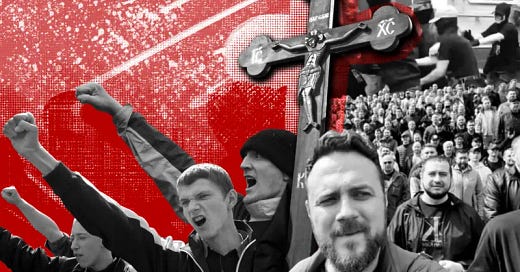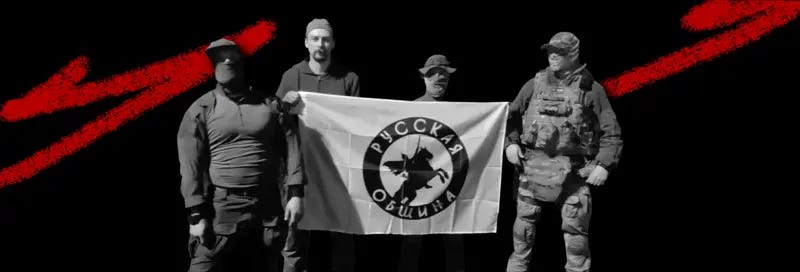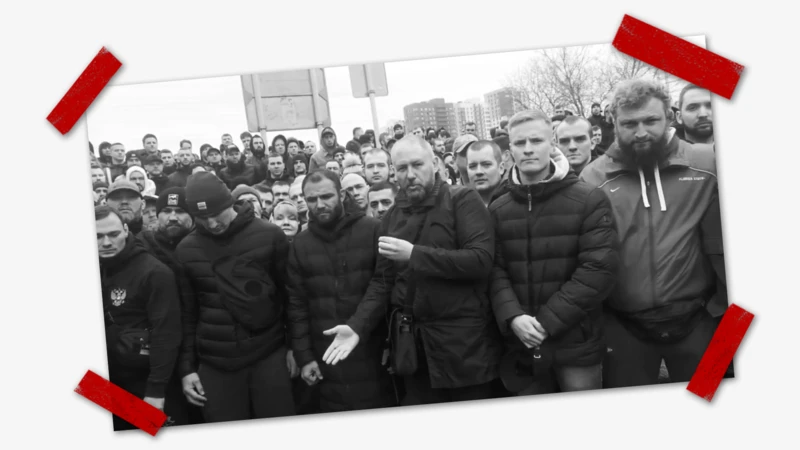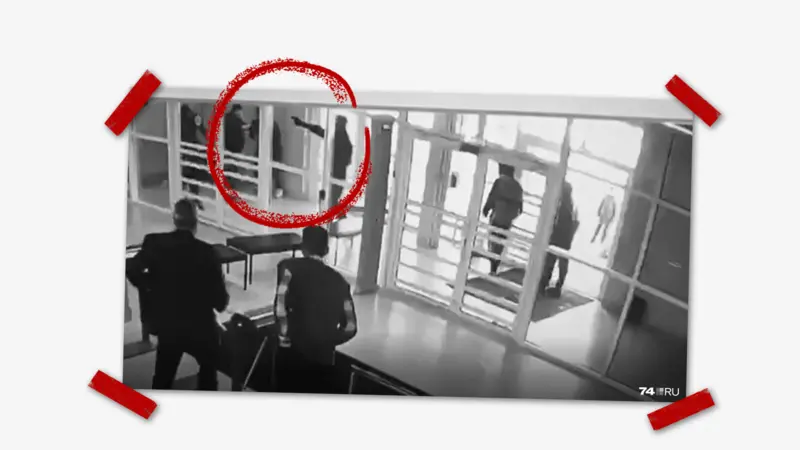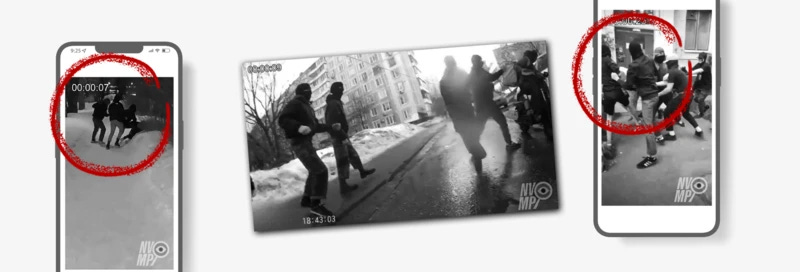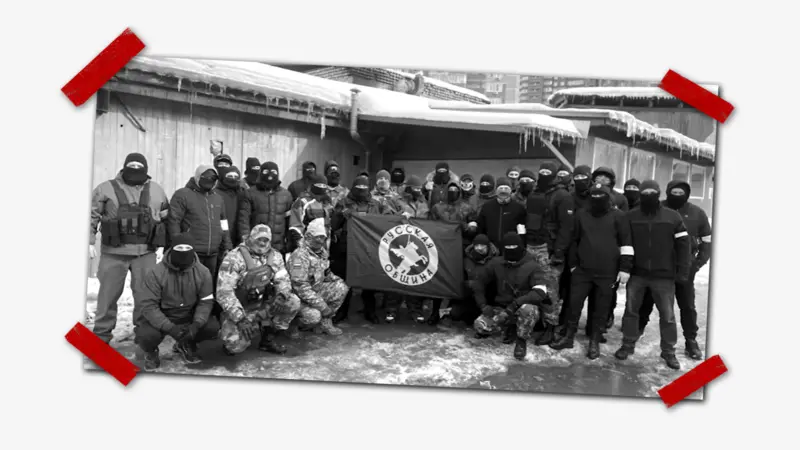"We are Russians: God is with us." The new far-right in Russia — and why the Kremlin lets it flourish
BBC Russian looks at how today’s Russian nationalists differ from the far-right movements of the recent past – and why this time they have not been crushed by the state.
By Amalia Zatari.
They support the war in Ukraine. They cheer on government repression of dissenting voices. They trumpet ‘traditional values’ and stand firmly against immigration, LGBT people and the right to abortion. When the police need a helping hand, they are ready to step in. ‘Russkaya Obshchina’ – the ‘Russian Community’ – is the largest far-right organisation in the country. It’s still growing.
This surge in racially-motivated attacks and hardline nationalist activity has not gone unnoticed by the authorities; yet little has been done to prevent it. BBC Russian looks at how today’s nationalists differ from the far-right movements of the recent past – and why this time they have not been crushed by the state.
“A strange sort of help”
Marina, 39, from the western Siberian oil town of Nizhnevartovsk, heard about the Russian Community from her friends.
"They said they help people, and that they have connections in the police," Marina told the BBC. She had been having problems with her ex-boyfriend, Maxim, who stalked her after their breakup, trashed her apartment, and took shots at the windows with an airgun. She reported Maxim to the local police, but they ignored her complaints.
Eventually, in December last year, she decided to turn to the ‘community members’ for help. Marina easily found the Telegram channel of the local cell, which was quick to respond. Five men - "young guys, around 30 years old" -drove to her home to talk to Marina in person.
She said she had met Maxim. They had quickly fallen into a romantic relationship, and he moved into her apartment, where she lived with the children from her first marriage. But she says Maxim began to change - he forbade Marina from talking to her friends or using social media, and started hitting her: "He slapped me, kicked me, and threw things at me."
A few months into the relationship, Marina realised she was pregnant. She secretly got an abortion: "I realised I had no other choice."
When in the end they broke up, he reacted angrily. On the day he was supposed to pick up his things, Marina says she found all the electric cables in the flat cut, the windows of the balcony smashed, the doors broken, the lid of the washing machine broken off, and the deep imprint of a hammer on the plasma TV.
That evidently wasn’t enough for him. Maxim came back several more times and began to fire at the windows from the street.
"The guys from the Russian Community listened to me calmly and with sympathy. They said they would try to do something, at least talk to him. Basically, they seemed ready to try to help somehow."
A few days later, Marina saw a new video on the Russian Community channel. It was called "Payback for Murder". An unknown 'community member,' without mentioning her name, was talking about Marina’s story and how she had asked them for help.
"The 'Russian Community' will not help this girl. She had an abortion. Our 'Russian Community' is against infanticide. Against abortions,” he said in the video. “We believe that no matter what the man is like, no matter the situation, it should never lead to killing your child out of anger towards your ex," he declared.
Marina was removed from the channel and blocked, she said. "For ‘The Russian Community,' having an abortion was a greater sin than anything my ex had done. According to them, it was all my fault. It’s a strange sort of help they offer," she said.
“The Unity of Russian people”
The ‘Russian Community’ appeared at the end of 2020. According to its website, the goal of the group is to "unite Russian people and provide all kinds of assistance to one another.”
We spoke by phone to one of the coordinators of the Russian Community, Pavel Omelnitsky, who runs its operations in the town of Yaroslavl, not far from Moscow.
“We have Armenian and Tajik diasporas here. They also live in close-knit groups, but nobody objects to a specifically Tajik diaspora. The ‘Russian Community’ is the same thing,” he argued.
Some regional branches explicitly state that the organisation welcomes any representative of the peoples that make up Russia if they consider themselves ‘Russian’. In others, for example, in the city of Ulyanovsk, they specify that membership is only for ‘Slavs’. [1] When asked why ethnicity was in both cases the uniting factor, Omelnitsky didn’t like the question: it “smacks of Russophobia,” he said.
The ‘Russian Community’ has several founders: Yevgeny Chesnokov, for example, a former coordinator of the ‘For Life’ anti-abortion organisation; a former government official from Omsk, Andrei Tkachuk; and Andrei Afanasyev, who works for the conservative ‘Saviour’ television channel.
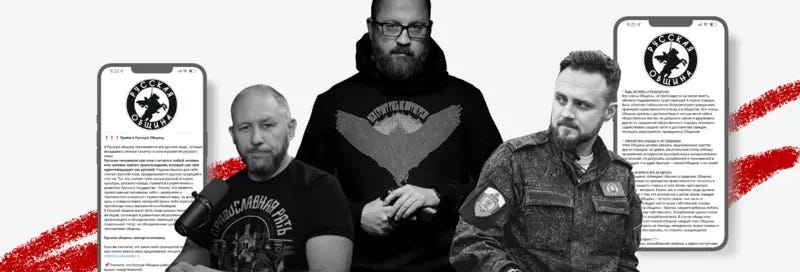
More than half a million people subscribe to the group’s main Telegram channel, ‘Russian Community ZOV’. The word ‘zov’ in Russian means ‘call’, and the letters may also refer to the Z, O and V identifications painted onto the military vehicles invading Ukraine.
The channel says it has nearly 150 regional branches across the country. The group’s Telegram channel in Moscow has more than 30,000 subscribers.
Omelnitsky took charge of the Yaroslavl branch of the Russian Community last year. He is 37 years old, is the father of many children, and calls himself a deeply devout man. He studied at the Moscow Theological Academy in Sergiev Posad, but took a break from the seminary in 2022, started collecting aid for Russian soldiers in Ukraine, and delivered it to the front lines. Two of his brothers were fighting there, one as a conscript, and the other joining him as a volunteer.
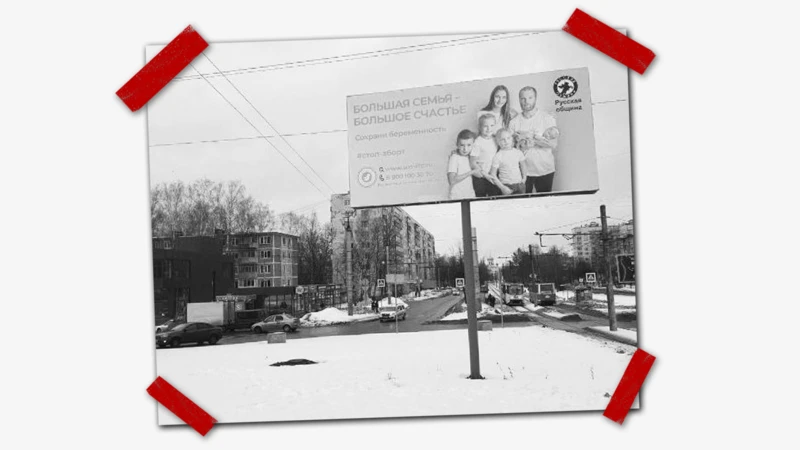
Even as a seminary student, Omelnitsky says, he had begun to worry about the growing division among people in Russia – and started to think about “how to revive unity” and how to encourage young people to go to church.
"At the same time, I realised that many people don't even know our Russian culture, or our Russian traditions," Omelnitsky says, explaining his decision to join the Russian Community.
Once he’d be accepted into the movement, Omelnitsky began to deliver aid for Russian soldiers on the behalf of the organisation. Other branches of the movement are also involved in purchasing and supplying food, clothing, and military gear, such as sights for guns. In May, ‘community members’ delivered anti-drone jammers and rifles, along with night vision equipment, to the frontline near Kharkiv.
Immigrants and (false) crime statistics
The furore around the building of a mosque on ‘Holy Lake’ near Moscow last spring brought the Russian Community widespread attention. Members of the movement joined other Orthodox activists in protest, bearing the slogan "We will not let our sites be defiled by a mosque."
Vladimir Putin and Patriarch Kirill have spoken often about the brotherhood of Christians and Muslims in Russia – and the Russian Community also emphasises the message. Their objection to the mosque was that in their view, it was not being built for indigenous Muslims (who they say have enough places of prayer) but for immigrants from Central Asia, whom they accuse of the “Islamisation of Russia”.
Pavel Omelnitsky was at pains to say that he has nothing against immigrants: “I have friendly relations with many of them, and they are wonderful people,” he tells the BBC. “What I won’t tolerate is crime and lawlessness. The nationality of the criminal does not matter. It is just that lately, criminals are more and more often migrants. It’s simply a fact.”
Omelnitsky is mistaken: the crime rate among immigrants is roughly proportionate to their number in the overall population. This year, in fact, according to Ministry of Internal Affairs statistics, the trend is downward. A spokeswoman for the ministry recently confirmed that the number of immigrants committing crimes has declined by 3.1%. Crime figures for foreign citizens are down 5% over the first seven months of 2024, almost twice as much for serious criminal acts, and by more than 20% for drug trafficking.
A resurgence in anti-migrant polemics is one of the trends noted by Vera Alperovich, an analyst with the Sova Centre, a body that monitors extremist activity in Russia.
"By the mid-2010s, law enforcement agencies had cracked down on virtually the entire ultra right environment, and this kind of discourse gradually faded to the background,” she says. “Recently, however, xenophobic anti-migrant discussion has been revived - and the ‘Russian Community’ has made a significant contribution to making its volume very loud in today's Russia."
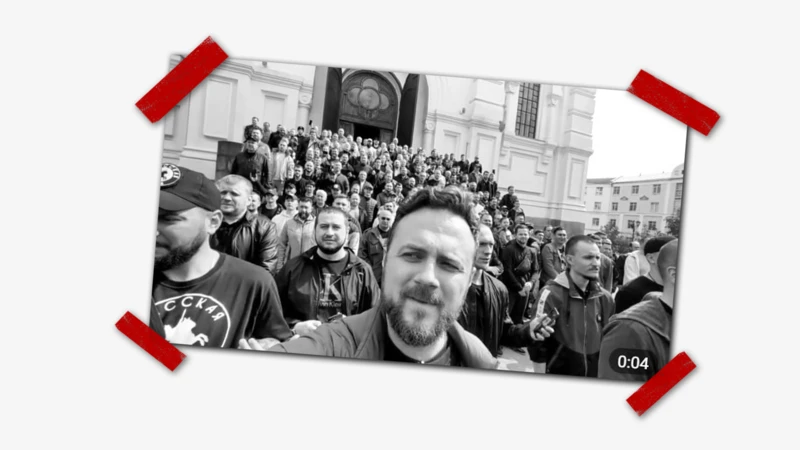
“Our Russian boys”
Across their social media channels, Russian Community branches regularly broadcast news of their activity – and the stories are often characterised by a xenophobic undertone “frequently adding an ethno-xenophobic context where none exists,” Alperovich says. “Whatever the issue - domestic, criminal, or anything else – this is the tendency of nationalists, and the Russian Community does it pretty successfully.”
News of “ethnic gangs” terrorising local residents across Russia is regularly featured on the main channel of the Russian Community. The majority of posts focus on migrants from Central Asia, but the Community also writes about people from the North Caucasus republics of Russia.
Subscribers get updates on "gangs of migrant teenagers extorting money from schoolchildren," "gangs of illegal migrant taxi drivers," "ethnic hoodlum gangs," "Abu bandit gangs," and any number of other “gangs” that ‘community members’ add derogatory descriptions to.
In February of last year, six young men wearing masks and wielding hammers stormed a school in Chelyabinsk. They were soon arrested, and some turned out to be minors. The Russian Community published extensive coverage of the incident and said the boys had arrived at the school to protect students from a "gang of Tajiks" who were allegedly terrorising the school and the entire district.
Soon, the detained teenagers were shown to be neo-Nazi sympathisers who had posed for photographs making Nazi salutes and sporting Nazi symbols, and had posted the images online. It emerged they had previously been involved in multiple ethnically-focused attacks and disorder.
One large far-right organisation, ‘Severny Chelovek’ or ‘Northern Man’, which often gathers with Russian Community members at joint events, distanced itself from the teenagers involved in the school attack. The Russian Community, by contrast, procured them legal representation. Some remain in pre-trial detention, referred to by fellow community members as “our Russian boys”.
“Without Russians, they will cut you up!”
"You are nothing without us, nothing. Do you fly airplanes? Create helicopters? I am proud of my Russian nation, a mighty country that stood against the USA!” A grey-haired high school teacher lambasts a Yazidi pupil in a classroom in Bataysk, near Rostov in southern Russia. “You don't even have your own language, you haven't created your own country! Without Russians, they will cut you up!"
The incident in April this year demonstrated the readiness of the Russian Community to involve itself in ethnic discord.
The 15-year-old schoolboy’s response outraged them: the child was no more than a "brazen teenager who decided to put Russians on their knees," while the teacher was a "respected educator." They gathered around a hundred supporters at the school, bringing along a Russian flag and imperial banners bearing the inscription "We are Russians: God is with us" and images of Jesus Christ.
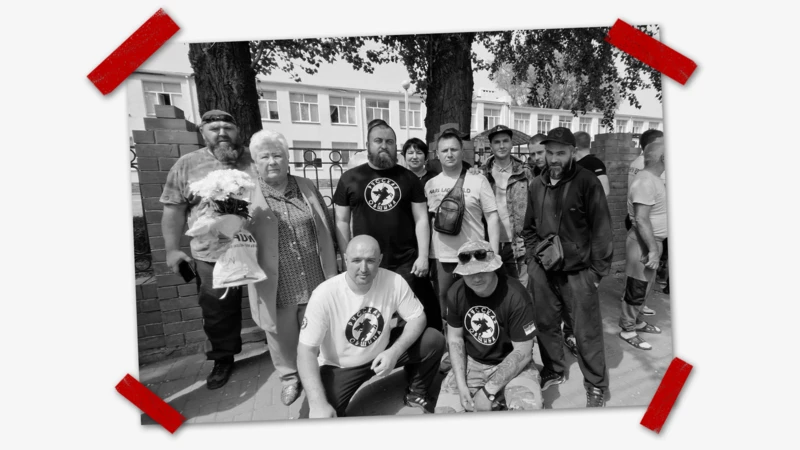
Six Russian Community members were detained at the protest, charged with breaching the peace, and arrested for three days. Their colleagues were infuriated and called on the Head of the Investigative Committee, Alexander Bastrykin, to look into the case. He reacted almost immediately, ordering an inquiry into the incident.
Bastrykin is a popular figure among Russia’s far right. He has repeatedly signalled his concern about mass immigration and the crime rate among migrants. Nationalists see him as sympathetic to their view of the country.
"Members of the Russian Community regularly appeal to Bastrykin on various matters. And experience shows that their appeals get a prompt response," notes Vera Alperovich from Sova. The BBC has sent a written request for comment to Russia’s Investigative Committee and awaits a response.
Members of the Russian Community are linked up by a smartphone app that lets them communicate with each other, or use the built-in ‘SOS’ button to call for help. Earlier this summer, it was still available on the Apple App Store. It appears to have been removed. Community members blame the Russian version of this article: “It turns out we weren’t to the taste of the Americans,” said Andrei Tkachuk, the group’s leader in Omsk.
We have asked Apple to comment. Meanwhile, you can still download the Russian Community app from Google Play. Their policy requires user content to be moderated, a spokesperson told the BBC, “including content that promotes violence or stokes hatred to individuals or groups of people based on any characteristic linked to systematic discrimination or marginalisation. If we discover breaches, we take appropriate steps.”
Russian Community members do not hide that they actively collaborate with the forces of law.
"We operate strictly within the framework of the law. I coordinate my actions with the FSB and Investigative Committee and other law enforcement agencies," says Pavel Omelnitsky, without going into further detail.
In January, officers of the law conducted a large-scale anti-migrant raid at a construction site in Yekaterinburg. Local members of the Russian Community took part and then posted a video of the operation on social media. The video caused an outcry. The Ministry of Foreign Affairs of Kyrgyzstan described the raid as “humiliating dignity” – three of those in the video were Kyrgyz citizens.
Community members cover similar raids, reporting how many were fined, deported or sent to military draft offices.
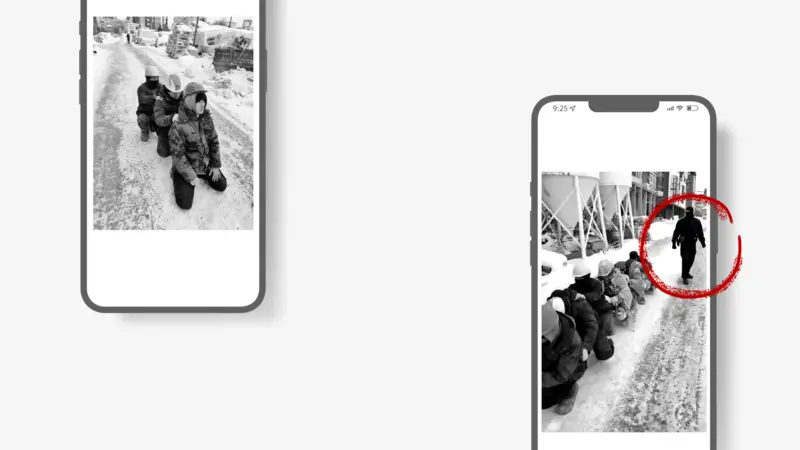
A mutually beneficial relationship with the law
The Russian Community concerns itself with more than immigration. In early March, activists from the organisation in Orenburg joined local law enforcement in a raid on a gay club, ‘Pose’. Soon after the raid, Russia’s first criminal extremism case was launched in respect of LGBT people – the club owner and several employees were arrested and charged with organising an extremist group.
During the raid, Russian Community members wore their organisation’s symbols and badges and posted videos taken inside the club on social media. The faces of those detained were not blurred.

They did not include video of their own behaviour, however. One club visitor who witnessed the raid alleges that Russian Community member “burst in and started beating guests, and immediately started looking for surveillance cameras so no one would find out. They sat some club staff down at tables and started asking questions. And if they didn't like the answers, they would hit their heads against the glass table."
Such extreme nationalist groups are not new to Russia. What is different now is an unprecedented level of cooperation with the forces of law, according to Alperovich. She says it suits both sides well:
"It benefits the police because the Russian Community effectively helps them do their job. And it benefits the Community because they can implement their ideological platform at the hands of law enforcement."
A bad time to be a revolutionary
In the 2010s, the ultra-right movement in Russia was in effect taken apart. Many of its key figures were dispersed through Russian penal colonies for lengthy terms, including for racially motivated murders and attacks.
"Nationalist groups traditionally were anti-systemic — potential revolutionaries. But over time, the authorities have dealt with the revolutionaries, so it became clear that such an agenda wouldn't get these groups very far," says Alperovich.
So they have long sought "some common ground for themselves and the authorities.” And common ground was found by identifying common enemies: criminal immigrants, gays, the liberal opposition, and more recently, those who oppose the war in Ukraine. They have also singled out the homeless, drug users and other vulnerable members of society.
Crime by members of far-right organisations has rocketed in the last two years. Against this backdrop, a group of activists launched the NVMP, the Nazi Video Monitoring Project, in September 2023.
The project organisers are volunteer activists who wish to remain anonymous to protect their safety. Monitoring far-right Telegram channels, they say they counted 96 attacks (62 on people and 34 on property, mainly on cars) in September. In March of this year they recorded 123 attacks, and in April 112.
Most of those detained for such attacks have been teenagers under 18, dressed in many videos like the Nazi skinheads of the Russian ‘noughties’.
The valued support of warmongers
The need to stoke enthusiasm for the fighting in Ukraine has boosted the far right even further, according to Sova Center director, Alexander Verkhovsky. The authorities need grass roots support for the war, which means any civil group that is loyal to the regime is valuable.
“This has created much more space for such groups –including radical ones,” he says. “Does that mean that the political regime wants to somehow incorporate radical nationalists? I don ‘t think so. The important thing is that they do not get in its way.”
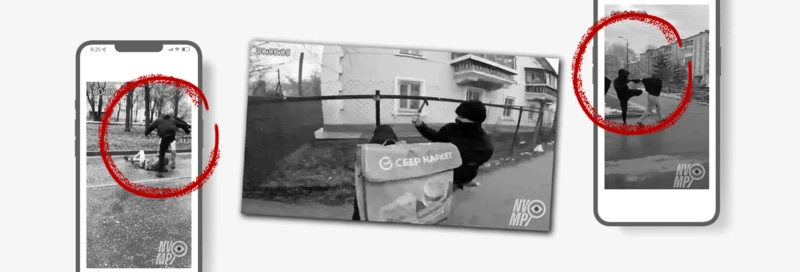
NVMP project admins agree that the need to fan support for the war has accelerated the ability of far-right groups to broadcast their messages – which include more than promotion of the war.
“By the autumn of 2022, far-right actors who had invested in military propaganda became the owners of vast media resources and gradually returned to their usual agenda - inciting ethnic hatred. With these new resources, the far right has become able to push its racist agenda into the media.”
A very different mission
Some of those behind the last wave of far-right activism in Russia are still inside the country. Dmitry Demushkin, now aged 45, was among the leaders of the so-called ‘Russian Marches’ and the founder of the Slavic Union, along with other extreme nationalist groups. He was detained and fined, and his various organisations were banned. In 2017, Demushkin was eventually sentenced to 2.5 years behind bars. Nobody from the Russian Community has been in touch.
“Why? Because they were formed by the very same people who banned us,” he tells the BBC.
“They have only three principles: not to rock the boat; to fight against those who rock the boat; and to agitate for the Special Military Operation. This is the whole of their purpose,” he says, using the official designation of the full-scale war in Ukraine.
Demushkin refers to the Russian Community’s claim to be helping out a short-staffed police force:
“Well, great – let them support the repression of their own protests, if they ever try to hold one. But they evidently never will protest: evidently theirs is a very different mission.”
Graphics by BBC Russian Visual Journalism team.
Read this story in Russian here.
English version edited by Chris Booth.
LONG READ: Tajikistan's terrorism problem
Why have so many Tаjiks been involved in terror attacks this year? The BBC meets the families of the men accused of the Moscow concert hall atrocity and asks security experts what's going wrong.

